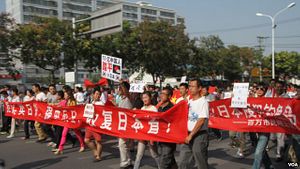When China’s leaders look at the outside world, what do they feel? Admiration? Love? Envy? Perhaps even pity or arrogance? From time to time, Chinese leaders sound like they shared all of these different attitudes. Even something as seemingly insignificant as Premier Li Keqiang going out of his way to praise any non-Chinese looking journalist who asked a question in Mandarin at his annual press conference in mid-March betrays something of what key Chinese think of the world around them. It’s a mixture of confidence verging on arrogance about China and its unique cultural, social, and historic attributes, often tinged with brittleness and shades of vulnerability, with flattery deployed to cover this over.
In The Improbable War, a stimulating and short book published recently, London School of Economics professor of international relations Christopher Coker hones in on one emotion in particular that he finds characterizes the current mood of China’s geopolitical self-image and the ways it ‘feels’ toward the outside world. This mood can be summarized as a constellation of feelings clustered around resentment.
Zheng Wang in his excellent Never Forget National Humiliation wrote in some detail about the “inner lives” of Chinese people. The historic narratives promoted by China’s government support the idea of victimhood, of the Chinese people finally emerging from a long period as colonially repressed and bullied subjects. This feeling of being put upon is the passive side of the coin. The active side, resentment, comes when people start considering actions like revenge — getting even or rectifying history’s injustices.
Coker divines in China a strong element of self-pity giving rise to more revengeful attitudes. He writes, “The problem with the Chinese Communist Party’s rendering of the past is that it encourages the Chinese people to remain frozen in a time of humiliation.” That is a highly negative frame of mind to be stuck in, and it drives some of the seemingly irrational ways in which China lashes out at the world around it.
This year, as both Li and Chinese Foreign Minister Wang Yi made clear last week, will see the 70th anniversary of the ending of the Pacific War. China was an ally of Europe and the U.S. in that war and played a major part, something which is often forgotten today, The real problem for this commemoration, however, is that it involves a relationship that enflames China’s strongest resentment – ties with Japan. Asked if Japan would be involved in the events planned in Beijing later this year, Wang, himself a Japan specialist, was evasive. An uncharitable interpretation of his tone would have said it was unwelcoming.
Visionary leaders might understand, as Coker’s comment implies, that while resentment after such a history is understandable, if it carries on too long it can become a debilitating and limiting frame of mind. Chinese leaders might decide that their journey to great nation status entails embracing more positive emotions. The U.S. can be the model here. Its national mood can be characterized in many ways, but resentment would not be one of them. For China, the 70th anniversary might be a moment to forgive some of the past, but not forget it — whatever the attitude of Japan. Forgiveness, after all, can be primarily for the benefit of the forgiver, rather than the one being forgiven.
Part of Xi’s “China dream” should involve moving away from resentfulness and embracing a more generous feeling toward the outside world. But there are few reasons to be optimistic at the moment that an emotional reset is remotely on the cards. Far from being an affirmation of reconciliation and new beginnings, it looks like the 70th anniversary is going to settle into the template created some decades ago – China keen to remind Japan in particular of its history of victimhood, and Japan accusing China of exploiting past pain for current gain.
The net result of this is that the rest of the world, while respectful of what is being commemorated, will want to keep their distance because of current politics. That will keep much of the world from joining in and both remembering and reflecting on a terrible war, but a war that has long ended. And that would be a pity, in view of the enormous contribution of China to the war effort, but is understandable in view of Beijing’s current resentful mood.

































